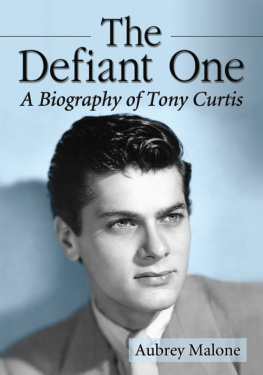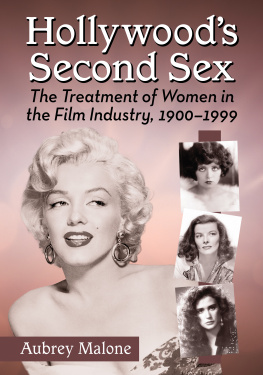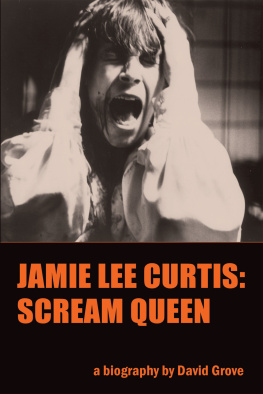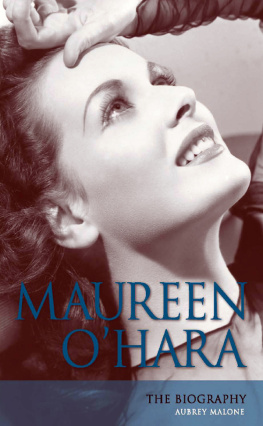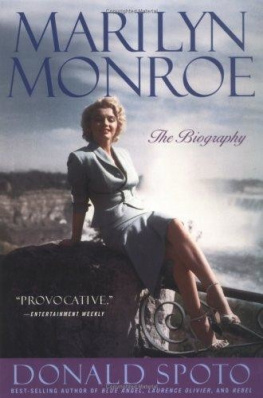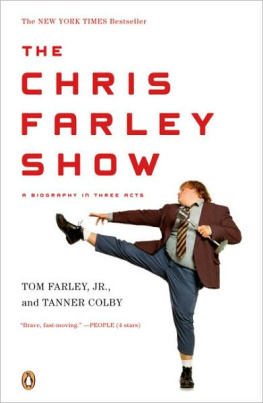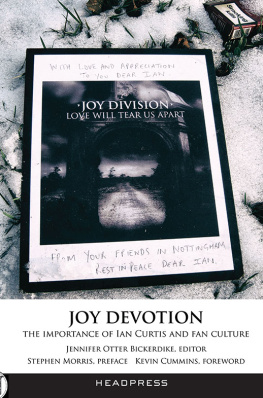
Also by Aubrey Malone
Censoring Hollywood: Sex and Violence in Film and on the Cutting Room Floor (McFarland, 2011)
LIBRARY OF CONGRESS CATALOGUING DATA ARE AVAILABLE
BRITISH LIBRARY CATALOGUING DATA ARE AVAILABLE
e-ISBN: 978-1-4766-0567-8
2013 Aubrey Malone. All rights reserved
No part of this book may be reproduced or transmitted in any form or by any means, electronic or mechanical, including photocopying or recording, or by any information storage and retrieval system, without permission in writing from the publisher.
On the cover: This is one of the first publicity stills of Anthony Curtis released by Universal-International shortly after he signed with them in 1949 (author collection)
McFarland & Company, Inc., Publishers
Box 611, Jefferson, North Carolina 28640
www.mcfarlandpub.com
Acknowledgments
I would like to thank Ned Comstock of the University of South California for his immense help in tracking down material for me from his archives. Thanks also to Kristine Krueger of the Margaret Herrick Library for her conscientious labors on my behalf. Thank you to Ian OSullivan of the British Film Institute for his many proles of Tony Curtis and features on him from the 1950s onwards, and to Rebecca Grant for giving me access to the library of the Irish Film Institute.
Special thanks to Mark Palmer for translating the books by Allegra Curtis and Christine Kaufmann for me, and to Hugh Comerford at Pearse Street Library for his help with the microche material.
Thank you to all the librarians from New York, London and Dublin for their help, to the lm distribution companies who tracked down old Tony Curtis movies, to all the booksellers who found rare books for me, to Chris Smedley and Linda Tresham and anyone else who worked tirelessly behind the scenes, especially Melissa Gooley and, Derek Savage.
Preface
I began this biography after interviewing Tony Curtis in March 1994. Shortly afterwards, sadly, he suffered a heart attack. Then his son Nicholas was found dead from a drug overdose. Finally, tragedies coming in threes, as they say, his marriage to Lisa Deutsch, his bride of just eighteen months, broke up. I put my book to one side but continued to chip away at it over the years. Now that Curtis is no longer with us, I felt the time was right to unearth my manuscript and use it to put his life and career into some kind of perspective.
Amazingly for such a major star, theres only one other biography of him extant, a ne book written by his friend Michael Munn called Nobodys Perfect. However, like all booksincluding Curtis own two autobiographiesit has left some gaps. Ive done my best to plug these with my own views of his life and career, as well as giving a more detailed treatment of his more important lms than previous writers.
Introduction
When I received a phone call from the Sunday Independent in March 1994 to ask me if I would like to interview Tony Curtis, I greeted the offer with only mild enthusiasm. I had been interviewing stars off and on over the years, and almost invariably they fell below expectations. In some instances they were positively boorish. This had the adverse effect of making me turn off their movies after meeting them. I was reminded of the old Gustave Flaubert dictum: Dont meet your idols. The gilt will rub off on your ngers.
Curtis had never been one of my favorite actors. Id enjoyed him in the two lms everyone talked about, Some Like It Hot and Sweet Smell of Success, but even in these I wasnt fully sure if it was Curtis himself Id admired or the directors or the other stars. The Boston Strangler, his most critically acclaimed performance, I had found monotonous and morbid. Even The Deant Ones, for which he garnered his one and only Oscar nomination, failed to impress me. (I felt it wore its earnestness too much on its sleeve.)
I changed my opinion of him after reading his autobiography. I had been blown away by it, imagining it to be one of the most engrossing confessional tomes from the inside track of Hollywood that had ever been written. If only Curtis could have acted as well as he wrote, I thought. He launched a full frontal assault on movies, on his background, his family, the people he worked with, his enemies and even his friends. It was a no-holds-barred trawl through Hollywoods mean streets and his own checkered past, beginning with an almost Dickensian upbringing as the dirt-poor son of dysfunctional Hungarian immigrants before he hit paydirt with Universal Studios in the late 1940s and managed to change Bernie Schwartz into Tony Curtis in a career that lasted over half a century.
He had also married four women by then and slept with hundreds more. He repeatedly insisted that he was nally reformed with his latest wife, Lisa Deutsch, but anyone who read the book would have had to greet that revelation with serious reservations. Would the man live up to the book? That was the main thought in my mind as he came over to shake my hand. As soon as I saw those merry eyes twinkling, though, I liked him already. He looked as if he was ready for some mischief.
He was every interviewers dream, never dodging a question but turning enough of them on their heads to make you marvel at his wit. Talking to him, it was almost impossible to imagine him getting angry with anyone or chewing them out. He looked like a jovial old bear, and I imagined him to have been a jovial young bear as well. All you had to do was press a button and he was off into yet another anecdote. Or the same one youd heard a hundred times before. But he always told them with a twist. It was like Take 2 (or 22), with added improvisations.
Lesley Salisbury once said that Curtis treated every question or comment of an interviewer as if it was the rst time he heard it, that he laughed quietly at the least hint of a joke from an interviewer and loudly at his own bon mots. I certainly found that to be the caseon all counts. You didnt mind the loud laughter because you were part of it too. He made the interview fun. He wanted to be your buddy, pulling at your sleeve as he made a point, thinking on the spot and making things up as he went along. When he embellished his anecdotes he was giving a performance, perhaps the only kind of performance permitted to him after the lm world had washed its hands of him. That made them even more precious, but also a little bit sad.
The Outsider
Tony Curtis once met a man who had the same birth name as himself, Bernie Schwartz, and also the same birthplace, New York. Their similarity seemed to be threatening to him. He turned to the man and said, I dont come from Brooklyn. I was born in London and kidnapped by gypsies. The truth was somewhat less exotic. In his autobiography he wrote about the jungle of East 78th Street and First Avenue where his pretty-boy looks made him a target for the local bullies.
He came into the world on June 3, 1925, the rst son born to Emanuel (Manny) and Helen Schwartz. Two more would follow. Emanuel and Helen were unhappy in their way. Emanuel had wanted to be an electrician but ended up becoming a tailor. Helen was physically abusive and also had schizophrenic tendencies. These were transmitted to her youngest son, Robert. (Robert would spend most of his life in an institution and die young.) The middle son was called Julius, or Julie. He was born four years after Bernie.
The Schwartzes were one of many immigrant Hungarian families in New York at the time. For four blocks in every direction from where we lived, he remembered, there were nothing but Hungarians, most of them as freshly over from Europe as we were, most of them hungry and poor. As Curtis said once, Hungary to me always meant hungry.
Next page
